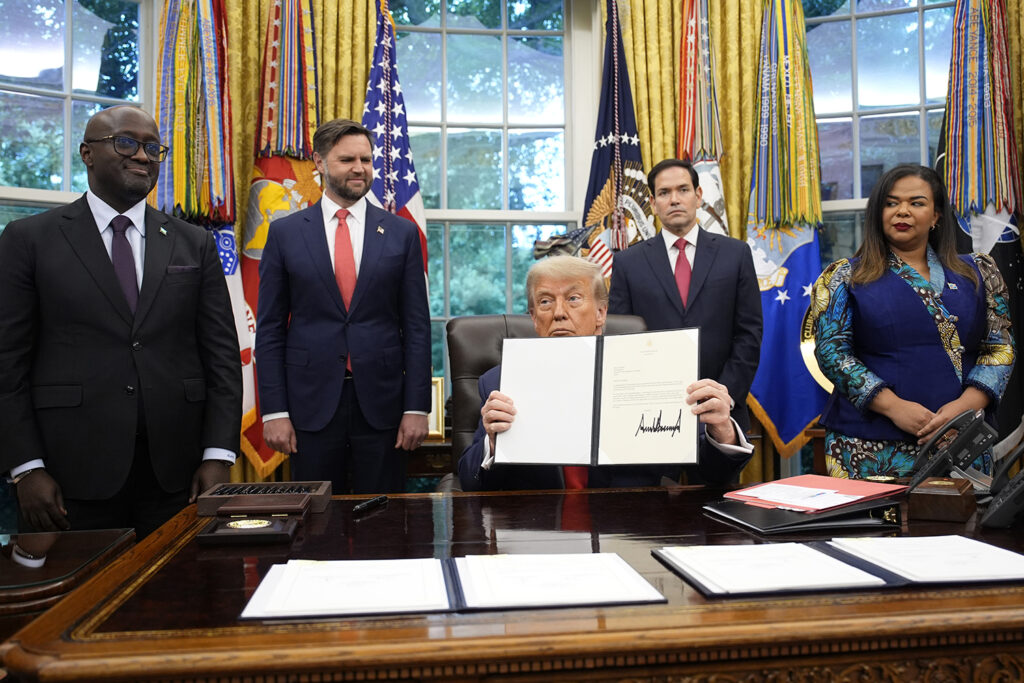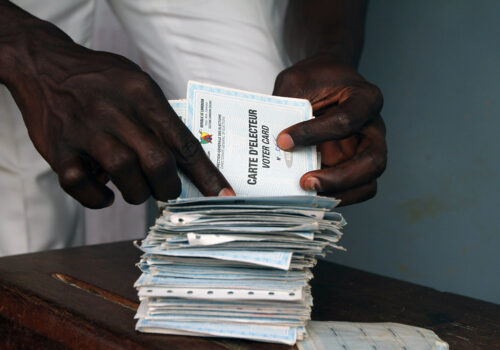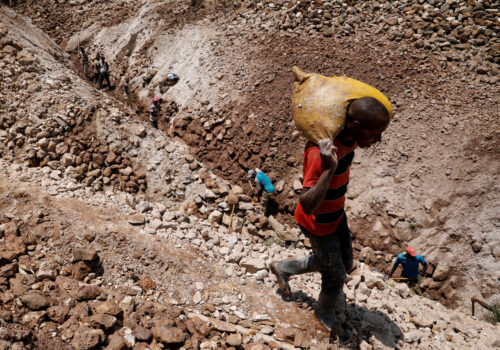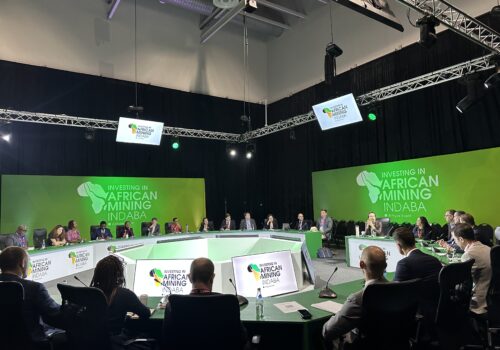It’s “been a long time waiting,” as US President Donald Trump put it. On Friday, the foreign ministers of Rwanda and the Democratic Republic of the Congo (DRC) signed a US-brokered peace deal aimed at ending a brutal conflict that has left thousands dead and millions displaced. Under the terms of the deal, the DRC and Rwanda agreed to respect each other’s territorial integrity and cease hostilities, while paving the way for greater US investment in the DRC’s critical minerals. Trump indicated that the two countries’ presidents would soon return to the White House for a signing ceremony for the “Washington Accord.” However, significant concerns remain, as the M23 militia, the Rwanda-backed rebel group that captured the major Congolese cities of Goma and Bukavu earlier this year, did not participate in these negotiations.
Will this agreement succeed in halting the fighting? And what does this mean for the US role in the region? Below, our experts read between the lines of the peace agreement.
Jump to an expert reaction
Frannie Léautier: This deal could redefine peace and power
Tressa Guenov: This deal could help resolve a complex conflict—and pose a challenge to China
Alexandria Maloney: A pivotal moment for Africa’s stability and the global energy transition
Will Mortenson: To ensure peace leads to prosperity, the DRC must prioritize the rule of law
This deal could redefine peace and power
This agreement, focused on responsibly sourcing and processing critical minerals, is about much more than mining. It is about recasting the narrative of Central Africa—from one of endless conflict to one of integrated opportunity. And it comes at a time when the world is racing toward a clean energy future that must be built not just with sustainable materials but with shared values.
For decades, the DRC’s substantial mineral riches have been both a blessing and a curse—fueling violence, enabling illicit trade, and entrenching poverty. This new agreement, however, links mineral access to governance, traceability, and regional cooperation. By recognizing Rwanda’s role in regional logistics and committing to a jointly managed, transparent minerals corridor, the deal offers a pathway out of zero-sum geopolitics and toward a model of mutual gain.
Like the recent US–Ukraine minerals agreement, this US–DRC deal aligns resource access with political stabilization. It signals a growing recognition in Washington that supply chain resilience is not just a commercial imperative—it’s a diplomatic and security one.
For the African continent, the most exciting prospect may be the acceleration of regional integration. This trilateral deal strengthens the case for the African Continental Free Trade Area by showing that cross-border cooperation is not only possible—it is strategic. The mineral corridor envisioned in this agreement could become a backbone for industrial zones, green energy clusters, and cross-border infrastructure linking East, Central, and Southern Africa.
It also opens the door for a new kind of diplomacy: one grounded not in competition for resources, but in shared stewardship. If successful, this model could be adapted elsewhere—from Guinea and Liberia to Mozambique and Tanzania.
This matters for several reasons:
- Security: By conditioning mineral trade on peace and governance benchmarks, the agreement could change the incentive structures that have enabled armed groups to thrive. If monitored and enforced with local buy-in, it could become a precedent-setting model for responsible sourcing in fragile contexts.
- The energy transition: With the West seeking alternatives in battery supply chains, Africa’s resource-rich nations are no longer peripheral—they are pivotal. A stable, ethically sourced stream of critical minerals from the DRC could anchor a new era of cleaner, more secure energy production.
- Technology and trade: This deal could lay the foundation for deeper US–Africa industrial cooperation, helping African countries move up the value chain through refining, battery assembly, and tech partnerships—rather than remaining exporters of raw materials.
- Peace-building. If designed for the long haul, this deal could help demonstrate that diplomacy and development are not side issues in energy policy—they are central to it.
What comes next? To turn this vision into reality, three imperatives must guide the path forward:
- Sustained US engagement: Beyond the initial announcement, the United States must invest in follow-through—technical support, financing tools, and diplomatic accompaniment.
- Local leadership and governance: Success hinges on the empowerment of Congolese and Rwandan actors—especially civil society and local businesses—who can ensure that mineral wealth is equitably shared and responsibly managed.
- Transparent and inclusive implementation: Trust will be key. Independent monitoring, grievance redress mechanisms, and community consultation must be embedded from day one.
—Frannie Léautier is a nonresident senior fellow at the Atlantic Council’s Africa Center and chief executive officer of SouthBridge Investment. She previously served as chief of staff to the president and vice president at the World Bank Group and senior vice president at the African Development Bank.
This deal could help resolve a complex conflict—and pose a challenge to China
The US-brokered peace agreement signed today in Washington between the DRC and Rwanda is welcome news that could begin to resolve this complex and bloody conflict. Previous peace efforts over numerous US administrations have been elusive, so successful implementation will depend on all parties fully committing to the long-term work that is needed for lasting peace.
The deal hinges on what is by now a familiar theme with the Trump administration: access to critical minerals for the United States. Chances are the device you are reading this on contains rare materials such as tantalum, tungsten, or coltan mined in the DRC or Rwanda. Critical minerals from these countries also go into nearly every form of high-end defense equipment manufactured today. But technology is not without consequences. Funds from the mines that extract these valuable metals have been diverted toward fueling the conflict and associated corruption.
China, which holds a monopoly over the DRC’s vast cobalt industry, will be watching this deal closely, as it too has a rapacious demand for critical minerals for its processing industry and for commercial and defense applications. China has reportedly supplied weapons to both the DRC and Rwanda. The deal could test China’s ability to navigate the region. Russia also has a strong history with the DRC and will surely be at the ready with misinformation about US intentions with the deal.
Paradoxically, if not carefully managed, any new critical mineral extraction and access that the United States seeks from the deal could further perpetuate the factors that have enabled the conflict to endure for so long (such as child labor, corruption, devastating violence, and environmental plunder). The nature of US participation in the long-term diplomatic and economic implementation of the deal is unclear. It will be made harder by the recent cuts to the US capacity for aid and development programs, which would be a vital tool in assisting with peacebuilding. The inclusion of women, who have suffered greatly in this conflict, and other disenfranchised groups will also be crucial for securing a lasting peace. Today’s announcement is an essential step in the right direction. Now the real work begins.
—Tressa Guenov is the director for programs and operations and a senior fellow at the Atlantic Council’s Scowcroft Center for Strategy and Security. Previously, she was the US principal deputy assistant secretary of defense for international security affairs in the Office of the Under Secretary of Defense for Policy at the US Department of Defense.
A pivotal moment for Africa’s stability and the global energy transition
The announcement of a peace and critical minerals deal between the United States and the DRC marks a pivotal moment—not just for bilateral relations, but for Africa’s long-term stability and the global energy transition. If successful, the deal could demonstrate how diplomacy, development, and strategic resource management can align to benefit all parties involved.
This agreement may provide a platform for stability and strategic cooperation by de-risking mineral supply chains essential for clean energy, formalizing governance in conflict-affected regions of the DRC, and empowering African stakeholders to shape global narratives around resource development. It could also bolster US commitments to mutual partnership as outlined in the US Strategy Toward Sub-Saharan Africa.
However, any optimism must be tempered with realism. The deal will be vulnerable if systemic challenges remain unaddressed. Fragile governance structures in eastern DRC, particularly weak institutional capacity and fragmented local authority, could undercut enforcement or public trust. If the agreement leans too heavily on extraction without corresponding investment in infrastructure, human capital, or environmental safeguards, it may risk deepening economic disparities rather than resolving them. Additionally, China’s entrenched footprint in the DRC’s mining sector may complicate implementation and heighten geopolitical tensions. Perhaps most critically, the exclusion of local communities or civil society organizations from negotiations could foster resentment and erode legitimacy, leading to long-term instability.
What cannot be missed is this: The opportunity here is not simply to secure minerals, but to establish a new model for engaging fragile, resource-rich states. That model must prioritize peace as the foundation, not the byproduct, of economic growth.
—Alexandria Maloney is a nonresident senior fellow with the Africa Center, president of Black Professionals in International Affairs, and a visiting lecturer at Cornell University
To ensure peace leads to prosperity, the DRC must prioritize the rule of law
The DRC-Rwanda peace deal is an incredible landmark in a long history of cross-border conflict that has prevented the DRC from truly capitalizing on its vast mineral resources. In no small part due to the persistent violence in eastern DRC, the country is one of the poorest and least prosperous countries in Sub-Saharan Africa, according to the 2025 Freedom and Prosperity Indexes.
While the foundational commitment to peace and to collaboratively stamping out militia activity in eastern DRC is undoubtedly the bulwark of this agreement, the importance of the joint commitment in enhancing trade and investment opportunities through existing regional frameworks cannot be overlooked. If peace does indeed prevail, the DRC stands to reap tremendous rewards from an enhanced ability to attract foreign investment. Multinational corporations and foreign governments (namely the United States, which helped broker the agreement) are chomping at the bit to access the country’s mineral resources, many of which are critical for emerging military and civilian technologies.
However, in order to capitalize on this opportunity to attract foreign investment and to ensure that the Congolese people benefit from it, the government of President Felix Tshisekedi must tackle corruption and establish a more robustly articulated and enforced rule of law. Establishing stability through the rule of law, low levels of corruption, and an efficient judiciary is essential for attracting outside investment. The DRC ranks among the lowest in the world in these metrics, placing 154th out of 164 countries covered in the legal subindex of the 2025 Freedom and Prosperity Indexes. Thus, only by initiating essential domestic reforms can the DRC take full advantage of the peace that this historic agreement promises to bring.
—Will Mortenson is a program assistant at the Atlantic Council’s Freedom and Prosperity Center, where he supports the center’s research, programming, and outreach.
Further reading
Fri, May 30, 2025
How the United States can support Cameroon as it faces its next democratic test
AfricaSource By
The United States can act now to support democratic elections in Cameroon and help the country navigate what unfolds after the vote.
Wed, Apr 23, 2025
Illicit mineral supply chains fuel the DRC’s M23 insurgency
EnergySource By
The illicit trade of mined materials is fueling the M23 insurgency in the eastern Democratic Republic of the Congo (DRC), threatening regional stability and hindering development. As the United States considers a minerals-for-security agreement with the DRC, international engagement, ethical sourcing practices, and strengthened oversight are critical to fostering long-term peace in this resource-rich region.
Thu, Mar 27, 2025
Prioritizing access to critical minerals will require prioritizing Africa
AfricaSource By Benjamin Mossberg
Access to critical minerals is an urgent national security issue. The United States must view investments in African energy, mineral, and mining—key to securing this access—with similar importance.
Image: US President Donald Trump speaks during a meeting with Democratic Republic of the Congo Foreign Minister Therese Kayikwamba Wagner (R) and Rwandan Foreign Minister Olivier Nduhungirehe (2nd-L) in the Oval Office of the White House in Washington, DC, on June 27, 2025. Photo by Yuri Gripas/Pool/Pool/Sipa USA via Reuters.



